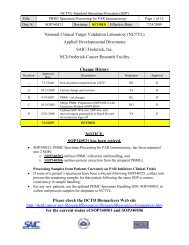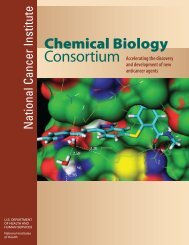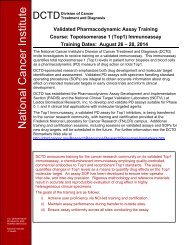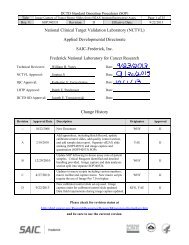National Cancer Institute - NCI Division of Cancer Treatment and ...
National Cancer Institute - NCI Division of Cancer Treatment and ...
National Cancer Institute - NCI Division of Cancer Treatment and ...
Create successful ePaper yourself
Turn your PDF publications into a flip-book with our unique Google optimized e-Paper software.
R A D I A T I O N R E S E A R C H P R O G R A M<br />
The Radiation Research Program supports research to find new ways<br />
<strong>of</strong> using radiation therapy more effectively <strong>and</strong> with fewer side effects,<br />
which is paramount for maintaining patients’ quality <strong>of</strong> life.<br />
Killing cancer cells while minimizing<br />
damage to healthy cells is the<br />
goal <strong>of</strong> radiation therapy. About<br />
half <strong>of</strong> all patients with cancer undergo<br />
radiation therapy, the majority <strong>of</strong> these<br />
with curative intent. Finding new ways <strong>of</strong><br />
using radiation therapy more effectively<br />
<strong>and</strong> with fewer side effects is paramount<br />
for maintaining patients’ quality <strong>of</strong> life. This<br />
entails innovative uses <strong>of</strong> technology <strong>and</strong><br />
biology <strong>and</strong> integration in multimodality<br />
cancer care <strong>and</strong> research.<br />
As part <strong>of</strong> an ongoing effort to stimulate<br />
research in radiotherapy <strong>and</strong> radiation<br />
biology, the Radiation Research Program<br />
(RRP) supports clinical, translational, <strong>and</strong><br />
basic research at the <strong>Division</strong> <strong>of</strong> <strong>Cancer</strong><br />
<strong>Treatment</strong> <strong>and</strong> Diagnosis (DCTD) by:<br />
■ Providing expertise to investigators who<br />
perform cutting-edge research using<br />
radiation <strong>and</strong> other forms <strong>of</strong> energy<br />
■ Assisting the radiotherapy research<br />
community in establishing priorities<br />
for the future direction <strong>of</strong> radiation<br />
research<br />
■ Providing medically underserved<br />
communities with access to radiation<br />
therapy<br />
■ Evaluating the effectiveness <strong>of</strong> radiation<br />
research being conducted by <strong>National</strong><br />
<strong>Cancer</strong> <strong>Institute</strong> (<strong>NCI</strong>) grantees<br />
O V E R V I E W<br />
RRP also coordinates its activities with<br />
other radiation research programs at <strong>NCI</strong>,<br />
the <strong>National</strong> <strong>Institute</strong>s <strong>of</strong> Health (NIH),<br />
other federal agencies, <strong>and</strong> national <strong>and</strong><br />
international research organizations.<br />
Additionally, RRP serves as a focal point for<br />
extramural investigators concerned with<br />
clinically related radiation oncology <strong>and</strong><br />
biology research.<br />
Dr. C. Norman Coleman, Associate Director<br />
C. Norman Coleman, M.D., holds an undergraduate degree<br />
in mathematics from the University <strong>of</strong> Vermont <strong>and</strong> received<br />
his medical training at Yale University School <strong>of</strong> Medicine.<br />
Dr. Coleman completed his internship <strong>and</strong> residency in internal<br />
medicine at the University <strong>of</strong> California, San Francisco, <strong>and</strong> a<br />
fellowship in medical oncology at <strong>NCI</strong>.<br />
Board-certified in internal medicine, medical oncology,<br />
<strong>and</strong> radiation oncology, Dr. Coleman was a tenured faculty<br />
member at the Stanford University School <strong>of</strong> Medicine before<br />
joining Harvard Medical School in 1985 as the Viola D. Fuller American <strong>Cancer</strong> Society<br />
Pr<strong>of</strong>essor <strong>and</strong> Chairman <strong>of</strong> the Joint Center for Radiation Therapy. In 1999, he became<br />
Director <strong>of</strong> <strong>NCI</strong>’s Radiation Oncology Sciences Program. Dr. Coleman created this program<br />
to coordinate all radiation oncology activities across all <strong>NCI</strong> components. He then<br />
served as Chief <strong>of</strong> the Center for <strong>Cancer</strong> Research’s Radiation Oncology Branch from<br />
1999 until 2004.<br />
Dr. Coleman currently is Associate Director <strong>of</strong> the DCTD Radiation Research Program,<br />
a Special Advisor to the Director <strong>of</strong> <strong>NCI</strong>’s Center for <strong>Cancer</strong> Research, <strong>and</strong> a Special<br />
Advisor to the <strong>NCI</strong> Director. Since 2004, he has been the Senior Medical Advisor at the<br />
Office <strong>of</strong> Public Health Emergency Preparedness for the U.S. Department <strong>of</strong> Health<br />
<strong>and</strong> Human Services. He also has written extensively in his field <strong>and</strong> has won numerous<br />
awards, including the 2005 Gold Medal Award from ASTRO (American Society for<br />
Therapeutic Radiation Oncology) for his many scientific <strong>and</strong> pr<strong>of</strong>essional contributions<br />
to the fields <strong>of</strong> radiation oncology <strong>and</strong> radiation biology.<br />
R A D I A T I O N R E S E A R C H P R O G R A M ■ 119










